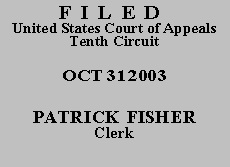

| TERRIE BRIGHT CRAFT,
Plaintiff-Appellant, v. DILLON COMPANIES, INC., Defendant-Appellee. |
|
Plaintiff Terrie Bright Craft filed suit in district court alleging that defendant Dillon Companies, Inc., her former employer, engaged in race discrimination and retaliation in violation of 42 U.S.C. § 1981 and the Civil Rights Act of 1964, 42 U.S.C. §§ 2000e to 2000e-17, when it reassigned, demoted and ultimately discharged her. She also alleged Dillon Companies violated public policy by discharging her in retaliation for filing a workers' compensation claim.(1) Based on the jury's verdict, the district court entered judgment in favor of the Dillon Companies. Ms. Craft appeals, arguing that the district court erred in refusing to give her proposed instruction, which relied on Reeves v. Sanderson Plumbing Products, Inc., 530 U.S. 133 (2000), and which directed that the jury could infer discrimination and retaliation, if the jury disbelieved the reasons provided by the Dillon Companies for its employment decisions. We hold the district court properly instructed the jury, and we therefore affirm.
"[T]he admission or exclusion of a particular jury instruction is left to the sound discretion of the trial court." Coletti v. Cudd Pressure Control, 165 F.3d 767, 771 (10th Cir. 1999).
To determine whether the jury was adequately instructed on the applicable law, we review the instructions in their entirety de novo to determine whether the jury was misled in any way. The instructions as a whole need not be flawless, but we must be satisfied that, upon hearing the instructions, the jury understood the issues to be resolved and its duty to resolve them.
Townsend v. Lumbermens Mut. Cas. Co., 294 F.3d 1232, 1237 (10th Cir. 2002) (quotation omitted). If the instructions as a whole adequately state the law, the district court's refusal to give a particular instruction is not reversible error. Coletti, 165 F.3d at 771.
Under the applicable law, the plaintiff's prima facie case along with sufficient evidence for a reasonable factfinder to reject the employer's nondiscriminatory explanation for its decision is sufficient to sustain a jury's finding of intentional discrimination or retaliation.(2) See Reeves, 530 U.S. at 140, 146-48; Townsend, 294 F.3d at 1240. "[A] trial court must instruct jurors that if they disbelieve an employer's proffered explanation they maybut need notinfer that the employer's true motive was discriminatory." Townsend, 294 F.3d at 1241.
After examining all given instructions, we conclude they correctly stated the applicable law and provided the jury with an ample understanding of the issues before it. See Brodie v. Gen. Chem. Corp., 112 F.3d 440, 442 (10th Cir. 1997). "To be improper under Reeves, the instructions would have had to tell the jury that evidence of pretext must be supplemented by evidence more extensive than that necessary to support the prima facie case . . . ." Brown v. Packaging Corp. of Am., 338 F.3d 586, 594 (6th Cir. 2003). The instructions given in this case told the jury no such thing. Accordingly, we hold the district court did not abuse its discretion in failing to give Ms. Craft's requested instruction. See Coletti, 165 F.3d at 772.
The judgment of the district court is AFFIRMED.
Entered for the Court
Circuit Judge
*. This order and judgment is not binding precedent, except under the doctrines of law of the case, res judicata, and collateral estoppel. The court generally disfavors the citation of orders and judgments; nevertheless, an order and judgment may be cited under the terms and conditions of 10th Cir. R. 36.3.
1. Before trial Ms. Craft voluntarily dismissed other state-law claims. She does not appeal the jury verdict against her on her Americans with Disabilities Act, 42 U.S.C. §§ 12111-12213, claim.
2. McDonnell Douglas Corp v. Green, 411 U.S. 792 (1973), and other Supreme Court cases "established an allocation of the burden of production and an order for the presentation of proof in . . . discriminatory-treatment cases." Reeves, 530 U.S. at 142 (quotation omitted). First, the employee must establish a prima facie case of discrimination. Id. If the employee does so, the burden then shifts to the employer to produce evidence that it took its employment action for a legitimate, nondiscriminatory reason. Id. Once the employer meets its burden, the employee must prove that this legitimate reason was not the employer's true reason, but was instead a pretext for discrimination. Id. at 143. The ultimate burden of proving discrimination always remains with the employee. Id.